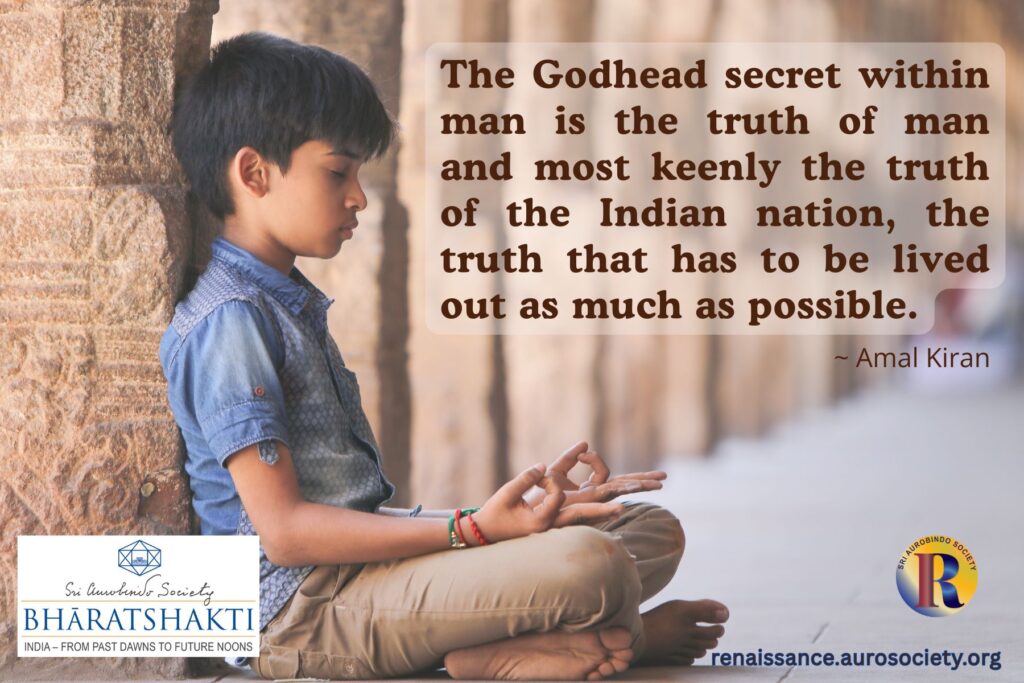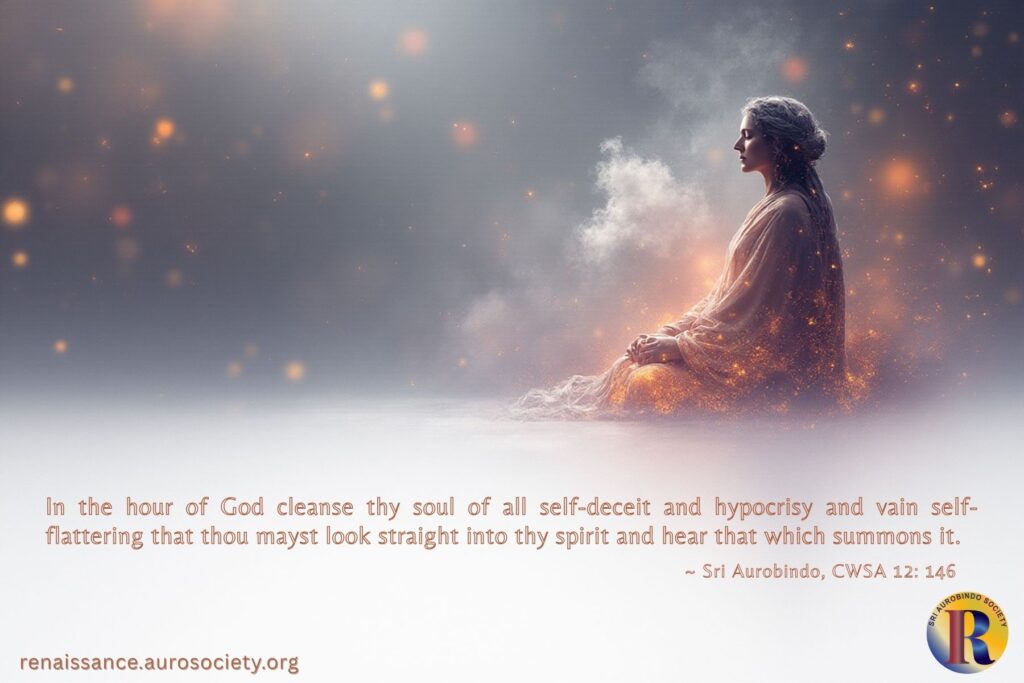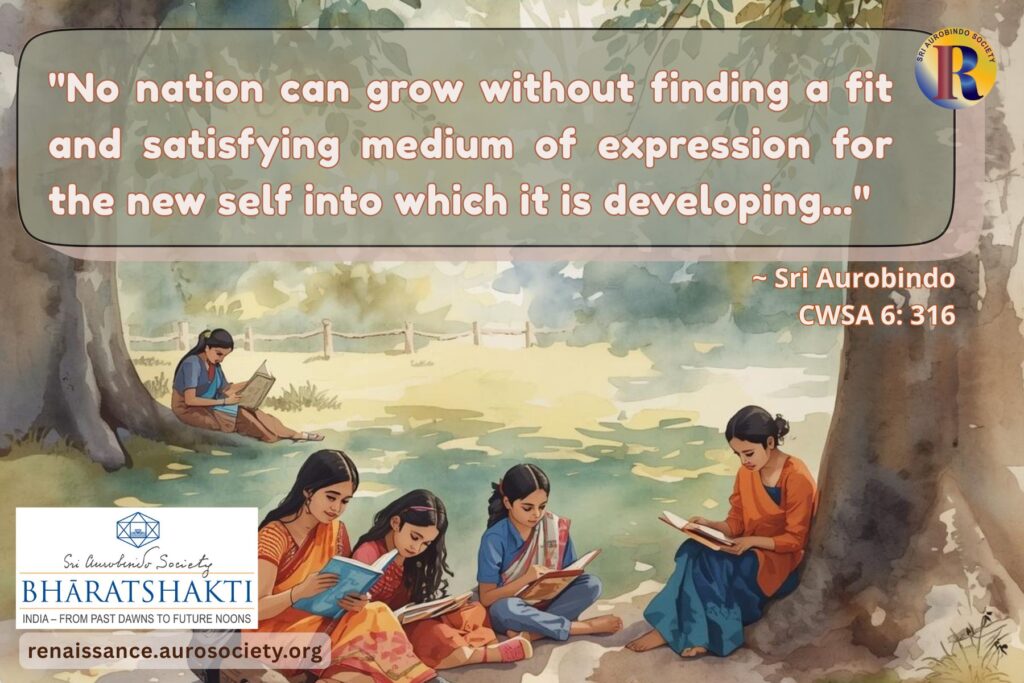Editor’s Note: This selection from Sri Aurobindo’s book The Human Cycle presents a detailed analysis of why in human history religion has not been a sufficient guide for conducting individual and collective life. He also tells us that this need not be so if we understand the true nature of religion, which is its spiritual core.
We have made a few formatting revisions — without altering the text in any way — for this digital presentation.

Since the infinite, the absolute and transcendent, the universal, the One is the secret summit of existence and to reach the spiritual consciousness and the Divine the ultimate goal and aim of our being and therefore of the whole development of the individual and the collectivity in all its parts and all its activities, reason cannot be the last and highest guide; culture, as it is understood ordinarily, cannot be the directing light or find out the regulating and harmonising principle of all our life and action.
Reason and Culture – Not the Last and Highest Guide
For reason stops short of the Divine and only compromises with the problems of life, and culture in order to attain the Transcendent and Infinite must become spiritual culture, something much more than an intellectual, aesthetic, ethical and practical training.
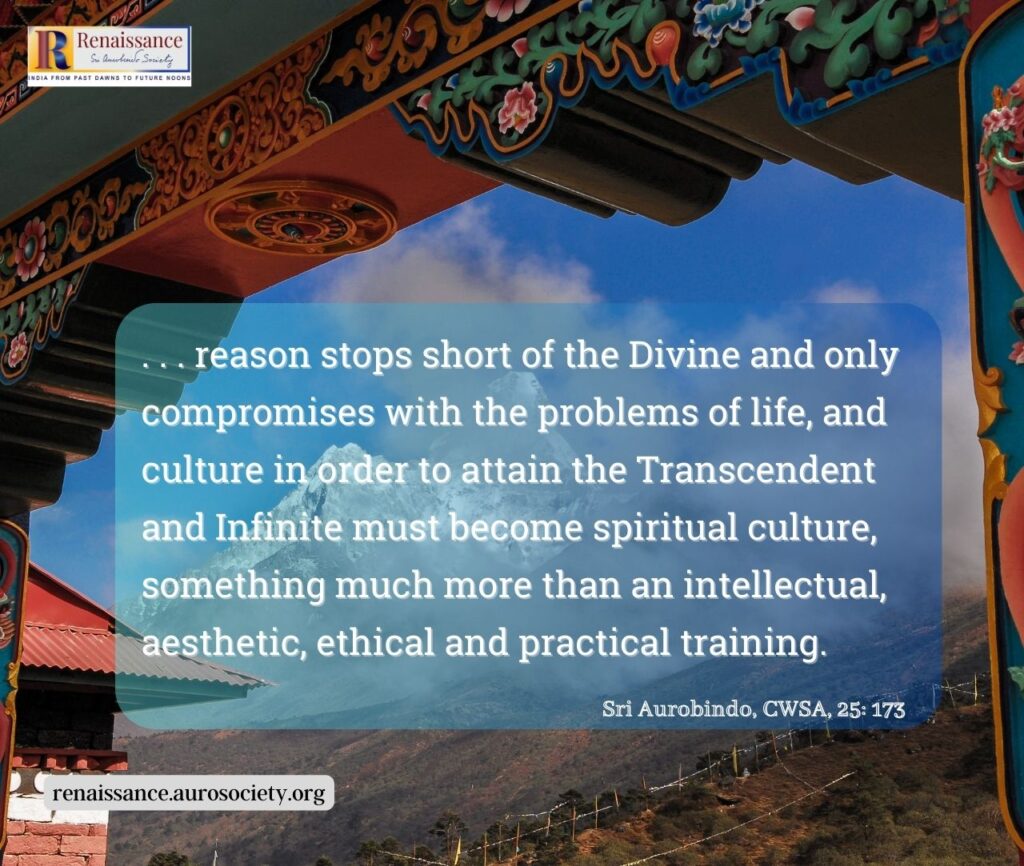
Where then are we to find the directing light and the regulating and harmonising principle?
The first answer which will suggest itself, the answer constantly given by the Asiatic mind, is that we shall find it directly and immediately in religion. And this seems a reasonable and at first sight a satisfying solution; for religion is that instinct, idea, activity, discipline in man which aims directly at the Divine, while all the rest seem to aim at it only indirectly and reach it with difficulty after much wandering and stumbling in the pursuit of the outward and imperfect appearances of things.
To make all life religion and to govern all activities by the religious idea would seem to be the right way to the development of the ideal individual and ideal society and the lifting of the whole life of man into the Divine.
A certain pre-eminence of religion, the overshadowing or at least the colouring of life, an overtopping of all the other instincts and fundamental ideas by the religious instinct and the religious idea is, we may note, not peculiar to Asiatic civilisations, but has always been more or less the normal state of the human mind and of human societies, or if not quite that, yet a notable and prominent part of their complex tendencies, except in certain comparatively brief periods of their history, in one of which we find ourselves today and are half turning indeed to emerge from it but have not yet emerged.
We must suppose then that in this leading, this predominant part assigned to religion by the normal human collectivity there is some great need and truth of our natural being to which we must always after however long an infidelity return.
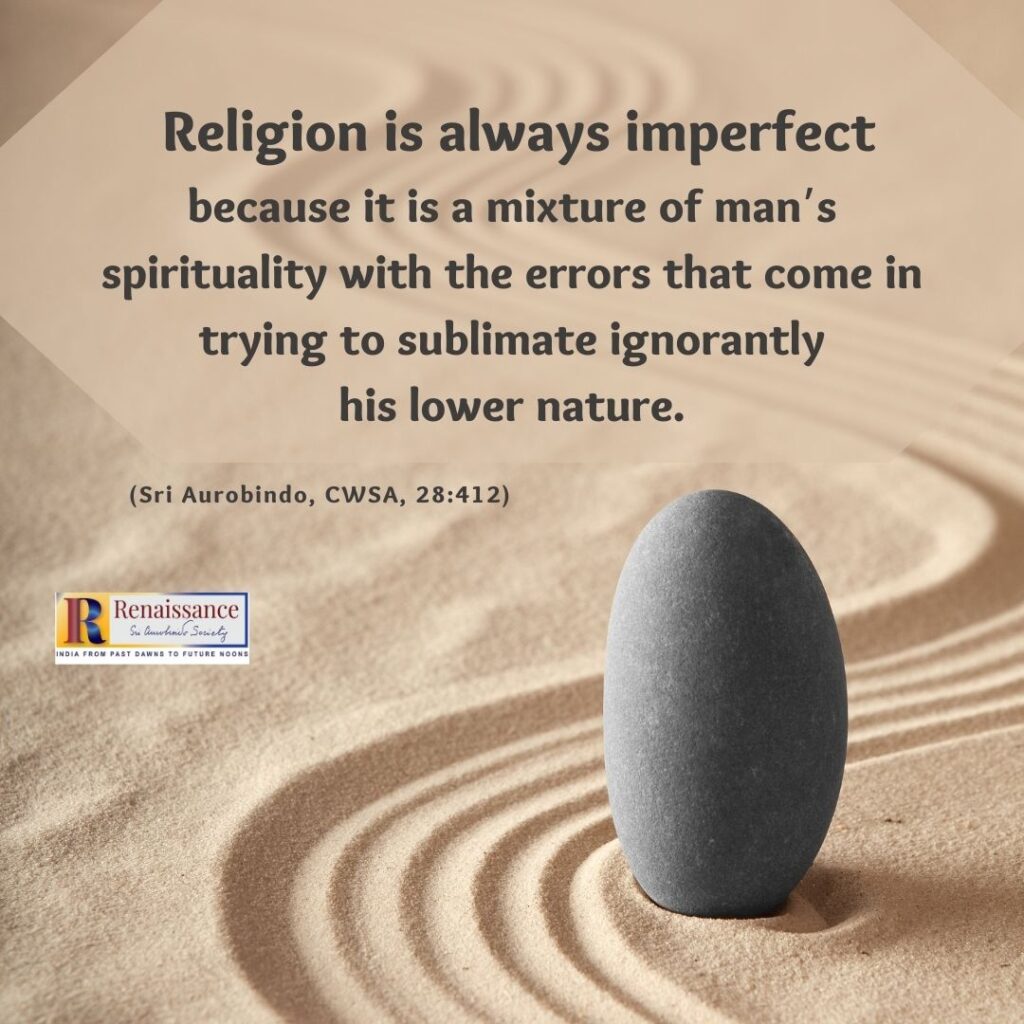
Revolt against Religion
On the other hand, we must recognise the fact that in a time of great activity, of high aspiration, of deep sowing, of rich fruit-bearing, such as the modern age with all its faults and errors has been, a time especially when humanity got rid of much that was cruel, evil, ignorant, dark, odious, not by the power of religion, but by the power of the awakened intelligence and of human idealism and sympathy, this predominance of religion has been violently attacked and rejected by that portion of humanity which was for that time the standard bearer of thought and progress, Europe after the Renascence, modern Europe.
This revolt in its extreme form tried to destroy religion altogether, boasted indeed of having killed the religious instinct in man,—a vain and ignorant boast, as we now see, for the religious instinct in man is most of all the one instinct in him that cannot be killed, it only changes its form.
In its more moderate movements the revolt put religion aside into a corner of the soul by itself and banished its intermiscence in the intellectual, aesthetic, practical life and even in the ethical; and it did this on the ground that the intermiscence of religion in science, thought, politics, society, life in general had been and must be a force for retardation, superstition, oppressive ignorance.
Also read:
Indian View on Religion, Dharma and Life
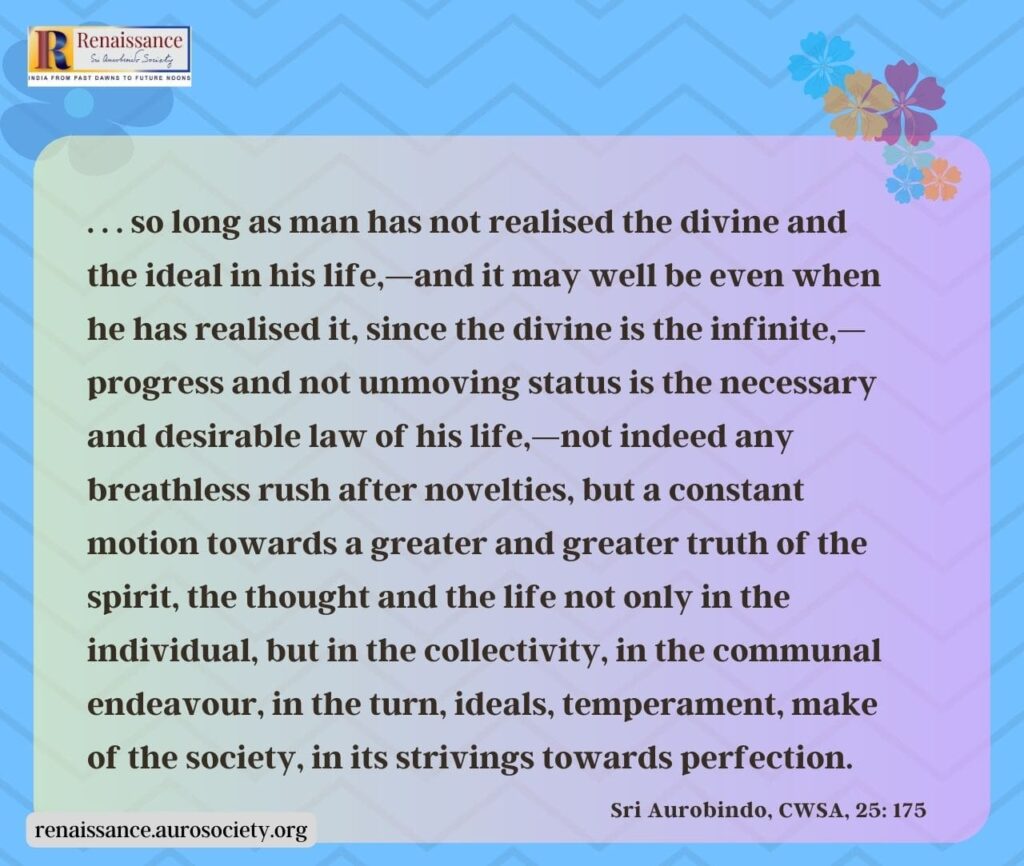
The religionist may say that this accusation was an error and an atheistic perversity, or he may say that a religious retardation, a pious ignorance, a contented static condition or even an orderly stagnation full of holy thoughts of the Beyond is much better than a continuous endeavour after greater knowledge, greater mastery, more happiness, joy, light upon this transient earth.
But the catholic thinker cannot accept such a plea; he is obliged to see that so long as man has not realised the divine and the ideal in his life,—and it may well be even when he has realised it, since the divine is the infinite,—progress and not unmoving status is the necessary and desirable law of his life,—not indeed any breathless rush after novelties, but a constant motion towards a greater and greater truth of the spirit, the thought and the life not only in the individual, but in the collectivity, in the communal endeavour, in the turn, ideals, temperament, make of the society, in its strivings towards perfection.
And he is obliged too to see that the indictment against religion, not in its conclusion, but in its premiss had something, had even much to justify it,—not that religion in itself must be, but that historically and as a matter of fact the accredited religions and their hierarchs and exponents have too often been a force for retardation, have too often thrown their weight on the side of darkness, oppression and ignorance, and that it has needed a denial, a revolt of the oppressed human mind and heart to correct these errors and set religion right.
And why should this have been if religion is the true and sufficient guide and regulator of all human activities and the whole of human life?
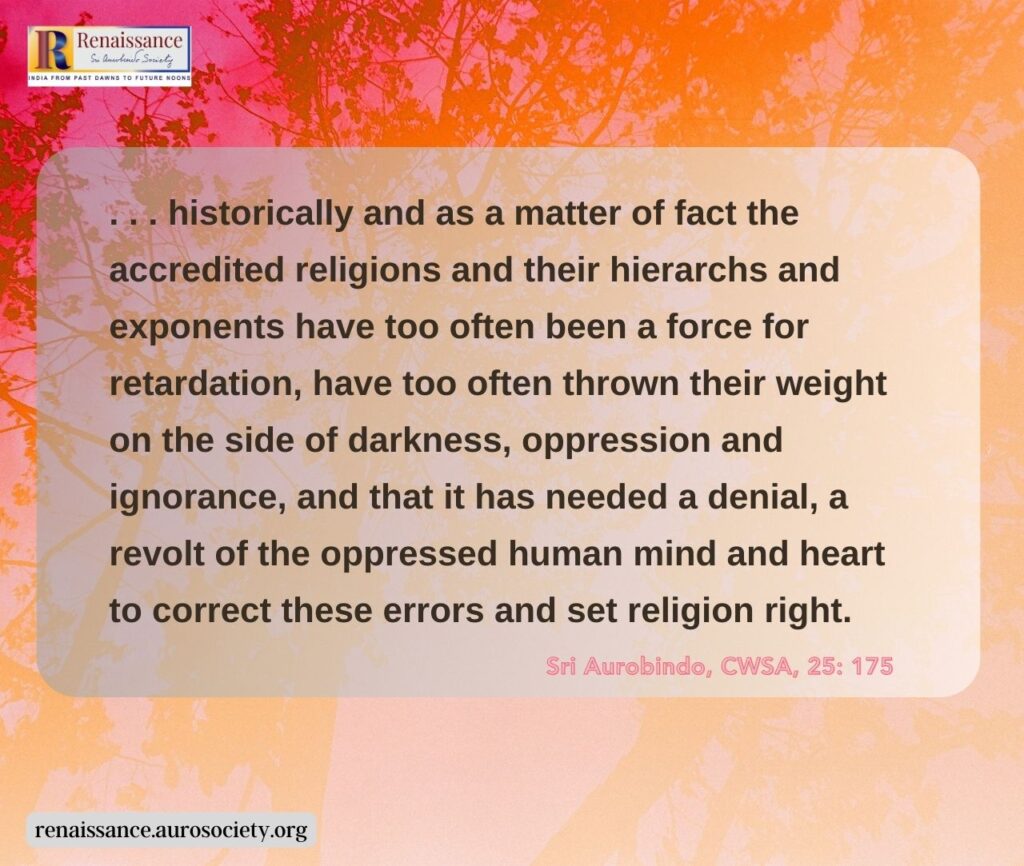
Understanding the Reason for Revolt against Religion
We need not follow the rationalistic or atheistic mind through all its aggressive indictment of religion. We need not for instance lay a too excessive stress on the superstitions, aberrations, violences, crimes even, which Churches and cults and creeds have favoured, admitted, sanctioned, supported or exploited for their own benefit, the mere hostile enumeration of which might lead one to echo the cry of the atheistic Roman poet, “To such a mass of ills could religion persuade mankind.”
As well might one cite the crimes and errors which have been committed in the name of liberty or of order as a sufficient condemnation of the ideal of liberty or the ideal of social order. But we have to note the fact that such a thing was possible and to find its explanation.
We cannot ignore for instance the bloodstained and fiery track which formal external Christianity has left furrowed across the mediaeval history of Europe almost from the days of Constantine, its first hour of secular triumph, down to very recent times, or the sanguinary comment which such an institution as the Inquisition affords on the claim of religion to be the directing light and regulating power in ethics and society, or religious wars and wide-spread State persecutions on its claim to guide the political life of mankind.
But we must observe the root of this evil, which is not in true religion itself, but in its infrarational parts, not in spiritual faith and aspiration, but in our ignorant human confusion of religion with a particular creed, sect, cult, religious society or Church.
So strong is the human tendency to this error that even the old tolerant Paganism slew Socrates in the name of religion and morality, feebly persecuted non-national faiths like the cult of Isis or the cult of Mithra and more vigorously what it conceived to be the subversive and anti-social religion of the early Christians; and even in still more fundamentally tolerant Hinduism with all its spiritual broadness and enlightenment it led at one time to the milder mutual hatred and occasional though brief-lived persecution of Buddhist, Jain, Shaiva, Vaishnava.
Historic Insufficiency of Religion as a Guide for Human Society
The whole root of the historic insufficiency of religion as a guide and control of human society lies there.
Churches and creeds have, for example, stood violently in the way of philosophy and science, burned a Giordano Bruno, imprisoned a Galileo, and so generally misconducted themselves in this matter that philosophy and science had in self-defence to turn upon Religion and rend her to pieces in order to get a free field for their legitimate development; and this because men in the passion and darkness of their vital nature had chosen to think that religion was bound up with certain fixed intellectual conceptions about God and the world which could not stand scrutiny, and therefore scrutiny had to be put down by fire and sword; scientific and philosophical truth had to be denied in order that religious error might survive.
We see too that a narrow religious spirit often oppresses and impoverishes the joy and beauty of life, either from an intolerant asceticism or, as the Puritans attempted it, because they could not see that religious austerity is not the whole of religion, though it may be an important side of it, is not the sole ethico-religious approach to God, since love, charity, gentleness, tolerance, kindliness are also and even more divine, and they forgot or never knew that God is love and beauty as well as purity.
Also read:
On Morality, Religion and Spirituality
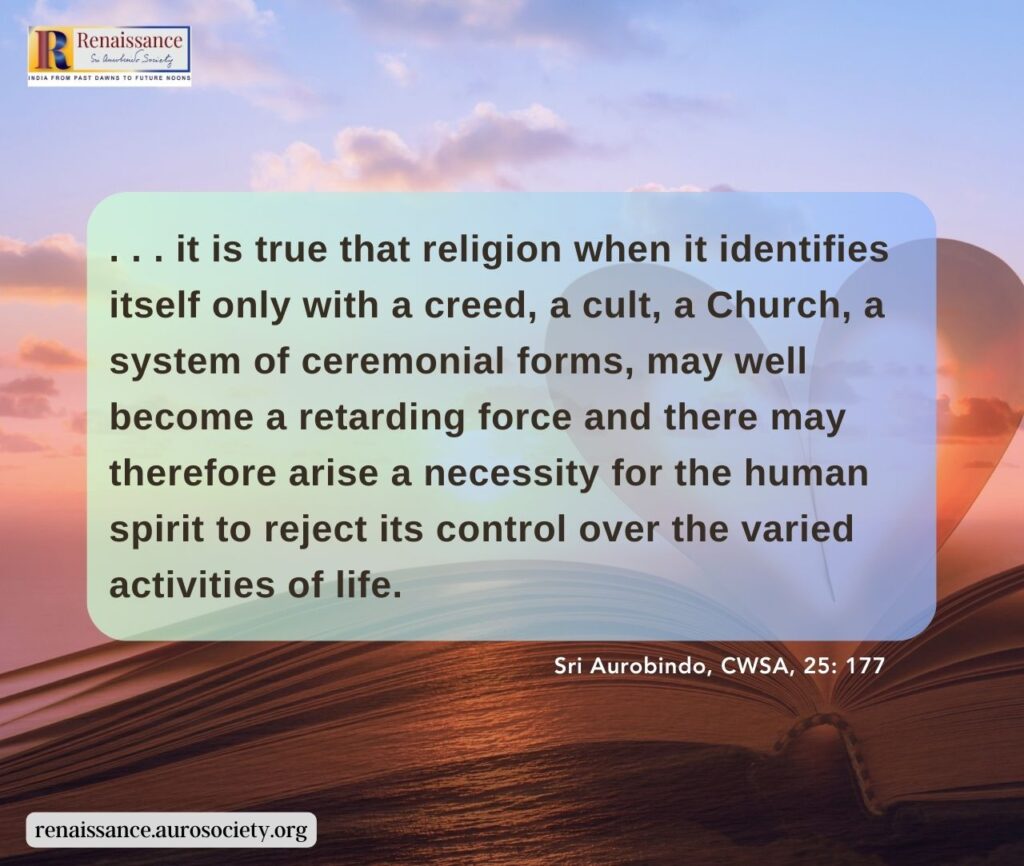
In politics religion has often thrown itself on the side of power and resisted the coming of larger political ideals, because it was itself, in the form of a Church, supported by power and because it confused religion with the Church, or because it stood for a false theocracy, forgetting that true theocracy is the kingdom of God in man and not the kingdom of a Pope, a priesthood or a sacerdotal class.
So too it has often supported a rigid and outworn social system, because it thought its own life bound up with social forms with which it happened to have been associated during a long portion of its own history and erroneously concluded that even a necessary change there would be a violation of religion and a danger to its existence. As if so mighty and inward a power as the religious spirit in man could be destroyed by anything so small as the change of a social form or so outward as a social readjustment!
This error in its many shapes has been the great weakness of religion as practised in the past and the opportunity and justification for the revolt of the intelligence, the aesthetic sense, the social and political idealism, even the ethical spirit of the human being against what should have been its own highest tendency and law.
Two Aspects of Religion
Here then lies one secret of the divergence between the ancient and the modern, the Eastern and Western ideal, and here also one clue to their reconciliation. Both rest upon a certain strong justification and their quarrel is due to a misunderstanding.
It is true in a sense that religion should be the dominant thing in life, its light and law, but religion as it should be and is in its inner nature, its fundamental law of being, a seeking after God, the cult of spirituality, the opening of the deepest life of the soul to the indwelling Godhead, the eternal Omnipresence.

On the other hand, it is true that religion when it identifies itself only with a creed, a cult, a Church, a system of ceremonial forms, may well become a retarding force and there may therefore arise a necessity for the human spirit to reject its control over the varied activities of life.
There are two aspects of religion, true religion and religionism.
True religion is spiritual religion, that which seeks to live in the spirit, in what is beyond the intellect, beyond the aesthetic and ethical and practical being of man, and to inform and govern these members of our being by the higher light and law of the spirit.
Religionism, on the contrary, entrenches itself in some narrow pietistic exaltation of the lower members or lays exclusive stress on intellectual dogmas, forms and ceremonies, on some fixed and rigid moral code, on some religio-political or religio-social system.
Not that these things are altogether negligible or that they must be unworthy or unnecessary or that a spiritual religion need disdain the aid of forms, ceremonies, creeds or systems. On the contrary, they are needed by man because the lower members have to be exalted and raised before they can be fully spiritualised, before they can directly feel the spirit and obey its law.
An intellectual formula is often needed by the thinking and reasoning mind, a form or ceremony by the aesthetic temperament or other parts of the infrarational being, a set moral code by man’s vital nature in their turn towards the inner life. But these things are aids and supports, not the essence; precisely because they belong to the rational and infrarational parts, they can be nothing more and, if too blindly insisted on, may even hamper the suprarational light.
Such as they are, they have to be offered to man and used by him, but not to be imposed on him as his sole law by a forced and inflexible domination. In the use of them toleration and free permission of variation is the first rule which should be observed.
The spiritual essence of religion is alone the one thing supremely needful, the thing to which we have always to hold and subordinate to it every other element or motive.
~ Sri Aurobindo, CWSA, Vol. 25, pp. 173-178
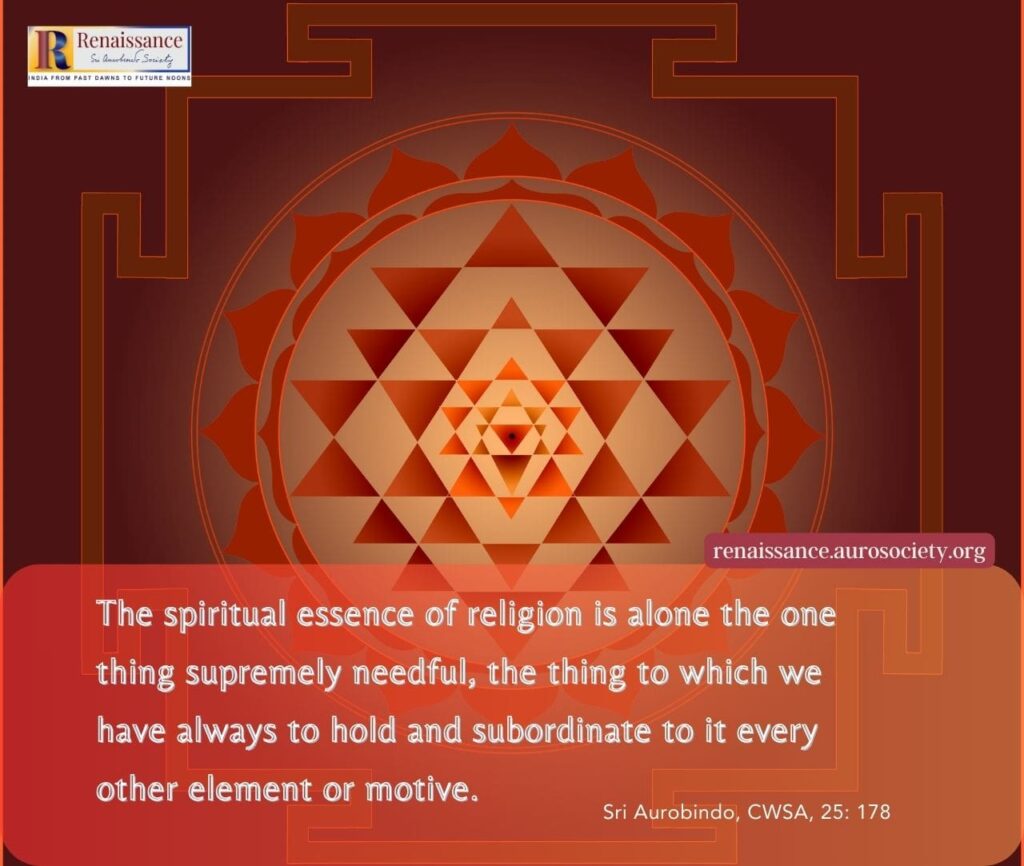

~ Design: Beloo Mehra & Biswajita Mohapatra

